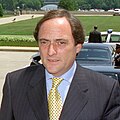XV Constitutional Government of Portugal | |
|---|---|
| Cabinet of Portugal | |
 Prime Minister José Manuel Durão Barroso | |
| Date formed | 6 April 2002 |
| Date dissolved | 17 July 2004 |
| People and organisations | |
| President of the Republic | Jorge Sampaio |
| Prime Minister | José Manuel Durão Barroso |
| Member parties |
|
| Status in legislature | Majority coalition government |
| Opposition parties |
|
| History | |
| Elections | 2002 Portuguese legislative election (17 March 2002) |
| Predecessor | XIV Constitutional Government of Portugal |
| Successor | XVI Constitutional Government of Portugal |
The XV Constitutional Government of Portugal (Portuguese: XV Governo Constitucional de Portugal) was the 15th government of the Third Portuguese Republic, under the Portuguese Constitution of 1976. The government was in office from 6 April 2002 to 17 July 2004 and was formed by a centre-right coalition between the Social Democratic Party (PSD) and the CDS – People's Party (CDS–PP). José Manuel Durão Barroso, leader of the PSD, served as Prime Minister.






